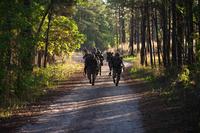A U.S. Senate delegation said Thursday that Afghan President Hamid Karzai risked losing the war to the Taliban through repeated delays in signing an agreement to keep U.S. forces in the country past 2014.
"We don't want to see what happened in Iraq, where we won the war but lost the peace," Sen. John McCain, R-Ariz., told reporters in Kabul following a meeting with Karzai.
The Obama administration has said that a major factor in the total withdrawal of U.S. forces from Iraq was Iraq's refusal to guarantee that U.S. troops in any follow-on force would be subject to the Uniform Code of Military Justice, and not Iraqi law.
McCain, joined by Sens. Lindsay Graham, R-S.C., and John Barrasso, R-Wyo., warned Karzai that failure to sign a new Bilateral Security Agreement with the U.S. would result in Afghan forces facing the Taliban without backup from U.S. and allied troops at the end of 2014, when all coalition combat forces are scheduled to withdraw.
McCain said after a meeting that he was "confident the differences have been narrowed to the point that we can resolve them" in matter of weeks, but warned that time was of the essence.
Graham and Barrasso also warned Karzai against the planned release of 88 detainees, who were transferred from U.S. to Afghan custody last year, from a prison north of Kabul.
The release "would be a major step backwards" and have "an unbelievably negative impact" on U.S.-Afghan relations," Graham said. "These people have blood on their hands. If the release goes ahead it will cause irreparable damage to our relationship," Graham said.
The U.S. and Afghanistan have already missed an initial Dec. 31 deadline for concluding a deal on a post-2014 U.S. troop presence to prop up the Kabul government against a Taliban emboldened by the withdrawal of coalition forces.
U.S. officials bluntly warned that the failure to sign a new Bilateral Security Agreement by Dec. 31 increasingly posed the risk that Washington would exercise the so-called "zero option," meaning that the U.S. would totally withdraw and close the checkbooks on the Afghan war.
"We are prepared to sign the agreement," Army Col. Steve Warren, a Pentagon spokesman, said Monday.
"We urge the government of Afghanistan to sign the agreement promptly," Warren said. "If we cannot conclude a BSA promptly, we will be forced to initiate planning for a post-2014 future that does not have a U.S. troop presence there."
Warren echoed what Marine Gen. Joseph Dunford, commander of the International Security Assistance Force, told reporters in Kabul earlier in December about the proposed BSA.
"If there's not an answer in December, I expect that we'll begin to do some more detailed planning about some other eventuality besides the [post-2014] mission," Dunford said.
A recent CNN/ORC International survey showed that the zero option would be of little concern to the American public. Only 17 percent said they supported the war in Afghanistan, while 82 percent were opposed.
The frustration over Afghan President Hamid Karzai's refusal to sign the BSA marked the end of a year that saw the fewest U.S. troop fatalities since 2007, when 117 were killed. A total of 127 Americans were among the 160 coalition troops who died in Afghanistan in 2013, according to the website icasualties.org.
The 2013 fatalities brought the number of U.S. troops killed in Afghanistan since October 2001 to 2,301, and the total for the NATO coalition to 3,409.
In addition, more than 19,000 U.S. troops have been wounded and the U.S. has spent more than $700 billion in the effort to establish a lasting democracy in Afghanistan that would deny a safe haven to Al Qaeda.
Currently, about 43,000 U.S. troops remain in Afghanistan and that number was expected to go down to 34,000 in February on the way to the complete withdrawal of U.S. and NATO combat troops by the end of 2014 under President Obama's plan.
The U.S. proposals for a new BSA reportedly include a post-2014 troop presence of 8,000-12,000 and the expenditure of more than $4 billion annually through 2024 to supply the nearly 350,000 members of the Afghan National Security Forces and pay their salaries.
One of the most detailed analyses of how the residual U.S. force might operate has come from Seth Jones, a former planning officer for the Combined Forces Special Operations Component Command–Afghanistan.
A robust U.S. force with Special Forces air and drone components would give the Afghans "a reasonable chance of assuring that the government is not overthrown" by insurgents after 2014, Jones, now a Rand Corp. analyst, said in a conference call with reporters in December.
For the past year, Karzai has repeatedly balked at approving the BSA, citing varying demands including a pledge by the Americans to forswear going into Afghan homes.
"I think he's likely to sign it," Jones said. "It's very important to him not to be seen as a stooge of the Americans."
Under Jones' scenario, the majority of the 8,000-12,000 U.S. troops that would stay in Afghanistan on an "internal defense mission" after 2014 would be assigned to training, advising and assisting Afghan forces.
The rest of the U.S. force would be charged with strikes against terrorists to kill or capture high-value targets and with operating unmanned aerial vehicles to conduct intelligence, surveillance, reconnaissance, and occasional strike missions.
In a paper for the Council on Foreign Relations, Jones and Keith Crane, another Rand analyst, envisioned having units from the Joint Special Operations Command working closely with Afghan partner units on counter-terror missions.
"It would also be helpful to draw on allied units, such as British Special
Air Service forces," the report said. "In addition, approximately three U.S. Army Special Forces battalions and other elements -- such as Marine Special Operations Teams and U.S. Navy SEALS -- would be necessary to train, advise, and assist Afghan national and local forces."
Jones and Crane stressed that the BSA should be signed quickly, preferably before the Afghan elections on a successor to Karzai scheduled for April, but Karzai has said that he may leave the decision on the BSA to his replacement in the presidential palace.




























